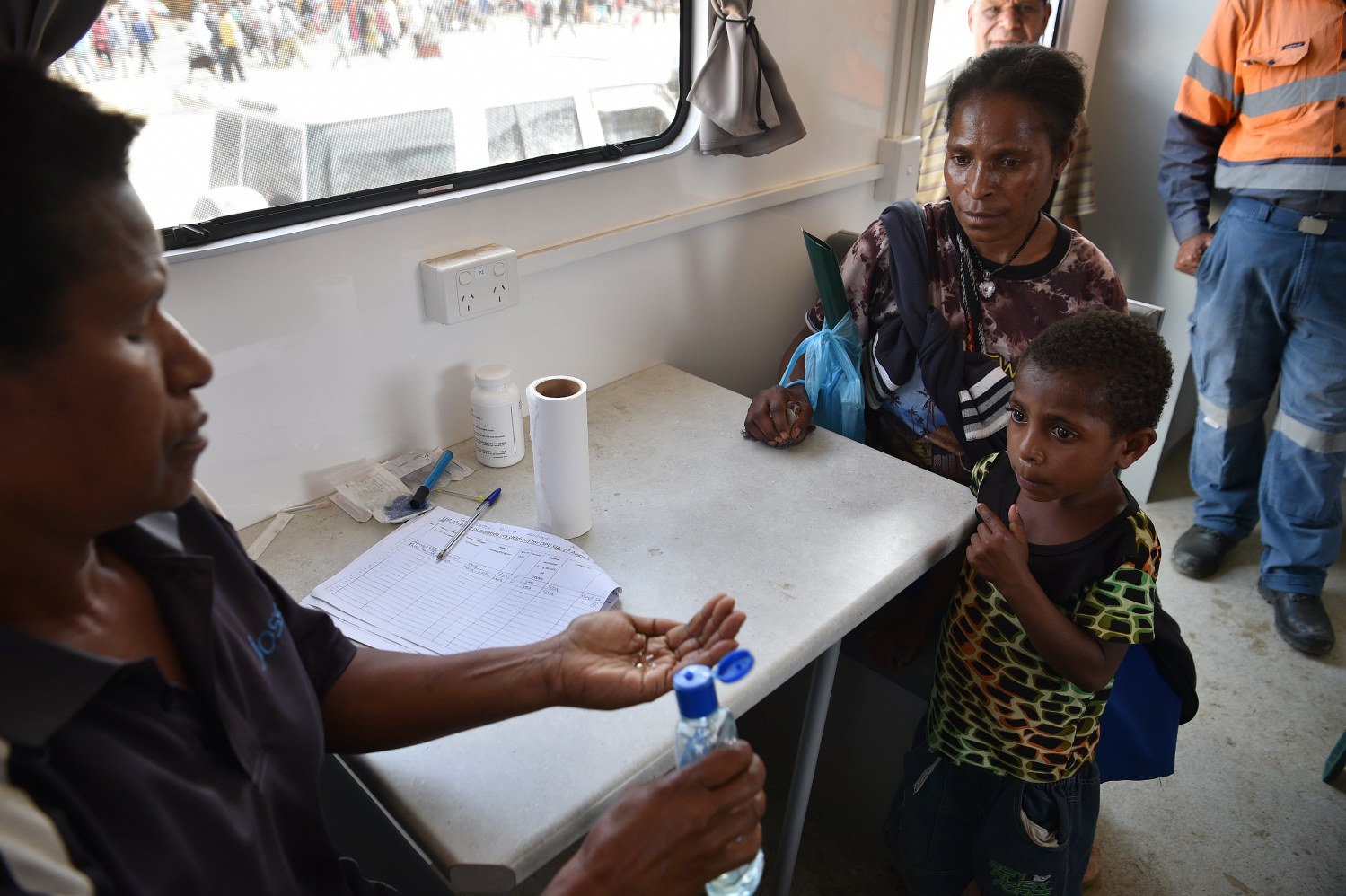Papua New Guinea scrambles to vaccinate as polio returns

Photo taken on November 22, 2018 shows health worker Margaret Akima (L) talking to 37-year-old Maria Ponde (R) and her six-year-old daughter Warapnong before recieving a polio vaccination in a mobile clinic on a street in Mount Hagen in the Western Highlands. – Decades after polio was eradicated from Papua New Guinea, the crippling and sometimes deadly disease has returned, leaving doctors scrambling to resuscitate long-lapsed vaccination programmes. (Photo by PETER PARKS / AFP)
MOUNT HAGEN, Papua New Guinea — Decades after polio was eradicated from Papua New Guinea, the crippling and sometimes deadly disease has returned, leaving doctors scrambling to revive long-lapsed vaccination programs.
Until earlier this year, the polio virus was endemic in only three countries in the world: Afghanistan, Nigeria and Pakistan.
But a relatively rare strain is now spreading throughout rugged, jungle-cloaked Papua New Guinea, one of the world’s poorest countries.
Since the first case was detected in April — paralyzing a six-year-old boy named Gafo near the northern coast — polio has infected dozens more nationwide, prompting the government to declare a national emergency.
Papua New Guinea, which today has a population of around eight million people, thought it had eradicated the wild variant of the virus in 1996, and was certified polio-free in 2000.
Article continues after this advertisementBut since then, experts say, lapsed vaccination programs and poor sanitation have left an open invitation for the prehistoric disease to return.
Article continues after this advertisement“It’s not a sudden surprise,” said Monjur Hossain, a UNICEF expert living in Port Moresby.
“The government knew about it,” he told AFP. “We all knew about it.”
In a cruel twist, the virus afflicting Papua New Guineans today — clinically known as VDPV1 — started life as a vaccine.
The much-weakened version of the polio virus was first ingested as an oral vaccine, before spreading throughout the community via feces.
Because of low-levels of immunization, the harmless attenuated virus continued to circulate person-to-person for a long period of time, allowing it to mutate into a more virulent strain.
Similar localized outbreaks of vaccine-derived polio have been previously detected in the Horn of Africa, Syria and the Democratic Republic of Congo.
Still, healthcare workers are adamant that the benefits of vaccination programs massively outweigh the risk of vaccine-derived polio.
World Health Organization experts estimate well over 10 million cases of polio have been averted worldwide since widespread vaccination began two decades ago, a 99 percent reduction.
But even with modern treatment, an estimated one in 100 cases of polio results in irreversible paralysis. A fraction of those who are paralyzed die.
‘Very expensive, very tough’
Doctors in Papua New Guinea are trying to respond to the crisis by providing countrywide immunization — with at least three oral doses for each child.
Hundreds of thousands have already been vaccinated.
Despite government and international support, the country’s lack of roads and unforgiving terrain — particularly in the central highlands — have made that task difficult.
Many villages can only be reached by air, or by day-long river trips.
Throw into the mix tribal violence, malnutrition, drought, multiple outbreaks of other diseases like measles and the aftermath of a massive February earthquake and things become more difficult still.
“It’s really challenging in terms of access, in terms of logistics,” said Hossain. “It’s very expensive and very tough.”
One answer has been to create mobile clinics that travel to villages far from populous areas like Mount Hagen — which itself has very few paved roads.
At one such clinic near Mount Hagen’s rough-and-tumble market, health worker Margaret Akima is virtually dragging mothers and their children into her barebones trailer.
In the first few days after setting up, she administered more than 100 doses of polio vaccine a day. By the final day of the two week stint, it is down to around 50.
From amid the throngs of bored men — fighting, shouting and playing darts — Akima picks out 37-year-old Maria Ponde.
She has traveled to Mount Hagen with her six-year-old daughter Warapnong to buy a spade head.
“I was not expecting her to get vaccinated,” Ponde said as the dose was administered to her daughter.
Warapnong has already missed a few courses of the vaccine and only received this one by fluke, underscoring how scattershot the response still is.